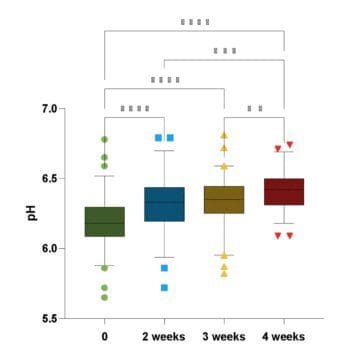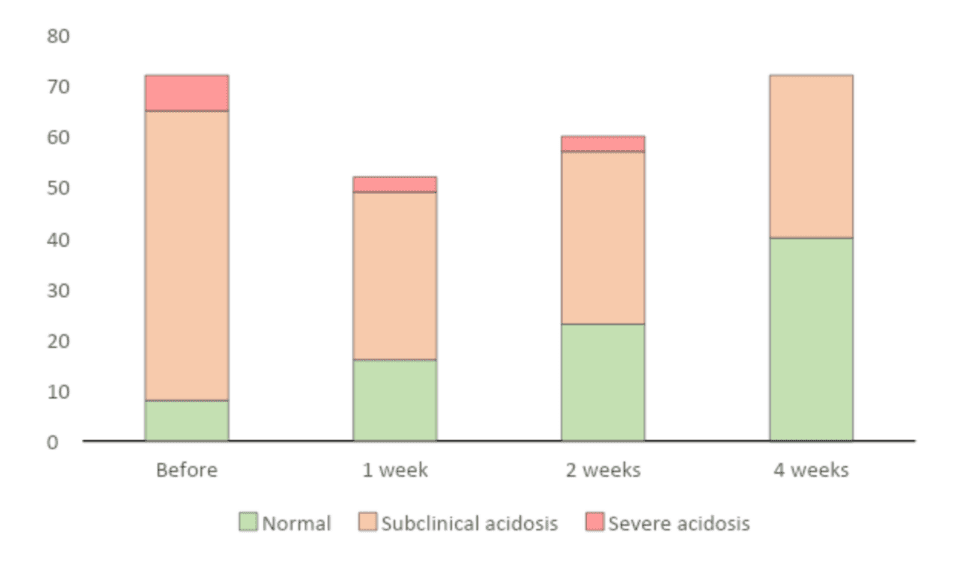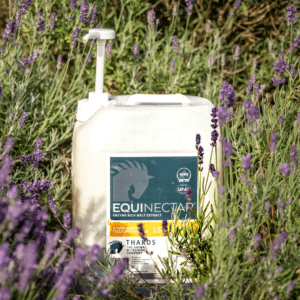
Volume 54, Issue 02, Pages 15-16 | January 09, 2024
Innovating equine health through scientific discovery
Rosemary Waring discovers how racehorse dietary changes affect their gut health.
This article was originally published in VetTimes on 9th January 2024 - published here
The following study on equine faecal pH is a natural extension of the author’s diverse research interests, which have included pharmacogenetics, carcinogenicity and the study of chronic diseases.
The focus on metabolomics and metagenomics research at Tharos and Ateria Health – particularly in identifying health-related changes in the gut microbiomes of humans and animals – has directly influenced the design and objectives of this study. The team wanted to find out how changes in racehorse diets – especially its patent-pending enzyme-rich malt extract – affected their gut health.
The extract is derived from malted barley and includes the naturally occurring enzymes alpha-amylase and beta-amylase, fructanase, xylanase, cellulase, beta-glucanase and phytase. The team used non-invasive methods to check the pH of their faeces as a sign of the balance of microbiomes in their guts.
Understanding the study’s context
The research aimed to explore the impact of enzyme-rich malt extract on the faecal pH of racehorses. This project was desirable because racehorses’ high-carbohydrate diets frequently exacerbate gut health issues, giving a proliferation of lactic acid-producing bacteria with a decrease in the short chain fatty acids (SCFAs), which are a major component of equine nutrition. The increases in lactic and acetic acids cause a pH drop in the horse’s hindgut, potentially leading to acidosis.
Several publications have linked faecal pH as providing a surrogate measure of the gut microbiome. A microbial balance is vital for equines and directly influences their overall health and performance.

Figure 1: Box and whisker plot showing mean (line), 25th and 75th percentiles (box) and 5th and 95th percentiles (whisker) with outliers as individual data points of fecal pH in 72 Thoroughbred racehorses receiving an enzyme-rich malt extract feed supplement. Significant differences are shown in the comparisons (**** = p<0.0001, *** = p<0.001, ** = p<0.005).
Methodology
Ethical considerations and animal recruitment
The team’s commitment to ethical research guided the entire study. The non-invasive nature of the data collection method meant that ethical review and approval were not required, aligning with best practices in animal welfare.
The team recruited 78 Thoroughbred racehorses from nine training yards across the UK, emphasising diversity and representativeness in its sample. The selection of horses was based on the discretion of their trainers, who each chose between 8 and 10 horses without specific selection criteria, ensuring a naturalistic study environment.
Data collection
Data collection was a critical component of the study. Researchers used the HI-981030 soil pH tester, a handheld pH meter, for its precision and ease of use. Faecal pH was measured in triplicate from three different areas of freshly produced faeces to ensure accuracy and consistency.
The team addressed outliers meticulously, recalibrating the device daily and cleaning it between samples. This approach guaranteed the reliability of its pH readings, which is crucial for the study’s integrity.
Experimental design
In terms of experimental design, all horses received EquiNectar (enzyme-rich malt extract) in their regular feed at a rate of 150ml twice daily. It was important to maintain the horses’ typical feeding patterns and routines, ensuring the observed effects were solely attributable to the enzyme-rich malt extract supplementation.
The horses effectively served as their own controls, based on previous pilot studies that confirmed stability in faecal pH over six weeks under unchanged diets and training schedules.
Statistical analysis
Statistically, the researchers took great care to ensure the rigour and relevance of their analysis. They presented all pH data as arithmetic means with 95% confidence intervals. The categorisation of faecal pH into “normal”, “subclinical acidosis”, and “severe acidosis” was crucial for interpreting the results in a clinically relevant context.
The team employed mixed-effects analysis with the Greenhouse-Geisser correction and Tukey’s multiple comparisons tests, ensuring robust statistical evaluation of data.
Findings
Faecal pH: an indicator of gut health
The study’s most significant finding was the marked increase in faecal pH in racehorses supplemented with enzyme-rich malt extract, marketed as EquiNectar.
Faecal pH, a proxy for gut health, rose from an average of 6.20 to 6.40 over four weeks of enzyme-rich malt extract supplementation. This shift is crucial, as even minor changes in faecal pH can have substantial implications for the gut microbiome’s balance and, consequently, the overall health of the horse.
Statistical significance
The statistical analysis revealed a compelling story. The increase in faecal pH was not only statistically significant (p<0.0001), but also clinically relevant. The researchers observed a notable rise in the proportion of horses with a “normal” pH — from 11% at the study’s outset to 55% at its conclusion. This leap is particularly significant, considering that a “normal” faecal pH is indicative of a healthy gut microbiome, crucial for a racehorse’s health and performance.
Practical implications
Most of the racehorses had relatively acidic faeces at the start of the study compared to those of grazing horses. Previous research has documented a pH in grazing horses in the range of 6.4 to 6.7, while a pH between 6.0 and 6.4 is characteristic of subclinical acidosis, with pH values below 6.0 being associated with osmotic diarrhoea.
Although their standard concentrated diet was unchanged, many horses developed a faecal pH comparable with that of grazing animals over the course of the study. This was a relatively short period of supplementation, and possibly more horses would have had a higher faecal pH if feeding had been continued.
From a practical standpoint, these findings suggest that dietary supplementation with enzyme-rich malt extract can effectively modulate the gut environment in high-performance horses. Given the common issues associated with high-carbohydrate diets in racehorses, such as hindgut acidosis, weight loss, inappetence, diminishing condition (muscle tone deterioration), demeanour changes and loss of performance consistency, the ability to influence gut health through a simple dietary addition is a significant stride forward in equine care.

Figure 2: Box and whisker plot showing mean (line), 25th and 75th percentiles (box) and 5th and 95th percentiles (whisker) with outliers as individual data points of fecal pH in 72 Thoroughbred racehorses receiving an enzyme-rich malt extract feed supplement. Significant differences are shown in the comparisons (**** = p<0.0001, *** = p<0.001, ** = p<0.005).
Broader implications
The broader implications of these findings extend well beyond the racecourse.
Another factor in the acidification of equine gut contents is the ingestion of fructans from new grass. These are resistant to digestion in the small intestine and are fermented in the large intestine, with a subsequent change in the balance of the microbiome and the production of acidic conditions, driven by increases in lactic acid. This is particularly relevant to the leisure horse, which is frequently turned out to graze on new rich pastures, as the process may trigger colitis.
This research provides a simple method for monitoring gut acidity and, therefore, equine health in both racehorse and leisure horse populations. It will give a foundation for exploring dietary interventions and different supplements in various equine disciplines, potentially improving the health and welfare of horses globally. Basically, measurement of faecal pH underscores the importance of gut health in equine medicine and opens new avenues for non-invasive monitoring and management.
Future perspectives
As a scientist and a director at Tharos, the author is pleased with these results. They not only validate her team’s approach to equine health, but also open doors to further research and development.
While the study focused on racehorses, the implications extend to horses across various disciplines. Next steps involve exploring long-term effects and broader applications.
The author’s team would welcome collaboration with horse health professionals and veterinary surgeons with a particular interest in the impact of gut health on the overall well-being and performance of equine athletes from all disciplines. Areas of interest include, but are not confined to, mineral and vitamin optimisation; the impact of discomfort resulting from dysbiosis on movement, and preventing injuries by improving gut health; the impact of negative demeanour and behaviours on training optimisation and performance in competition; respiratory diseases; exercise-induced pulmonary haemorrhage; and vices (box walking, crib biting, windsucking, weaving, and so forth).
Concluding thoughts
This study underpins a commitment to improving equine health through scientific innovation. The team is dedicated to continuing this journey, ensuring products such as the enzyme-rich malt extract are not just supplements, but key components in the holistic management of equine health.
- The author would like to thank Mark Bowen for his help in data analysis and veterinary advice, and Ben Nedas for creating the study design and methodology, combining technical skills and scientific knowledge to provide the app which improved data collection and analysis. The author is also grateful to Tim Jones for his work in recruiting the participants, managing the study and collecting samples. Their contributions have helped the research go forward and increased the team’s understanding of equine health.
ABOUT EQUINECTAR
Description
EquiNectar® is a natural feed supplement, that is scientifically proven to:
- Re-balance your horse’s gut bacteria
- Help your horse maximise benefits from its feed
- Improve your horse’s condition
More information
EquiNectar® is produced by Tharos Ltd in the UK. It is a natural source of digestive enzymes and contains only the following ingredients:
- Our patented enzyme rich malt extract
- Medium chain triglycerides (from coconut oil)
- Potassium sorbate
For more details of the enzymes within EquiNectar® take a look at the ingredients and enzymes page.
How to feed
Simply add EquiNectar® to your horse's daily feed, using the Feeding Rate chart to determine the correct amount.
For detailed instructions about how to introduce EquiNectar, please read the comprehensive Feeding Guide page.





